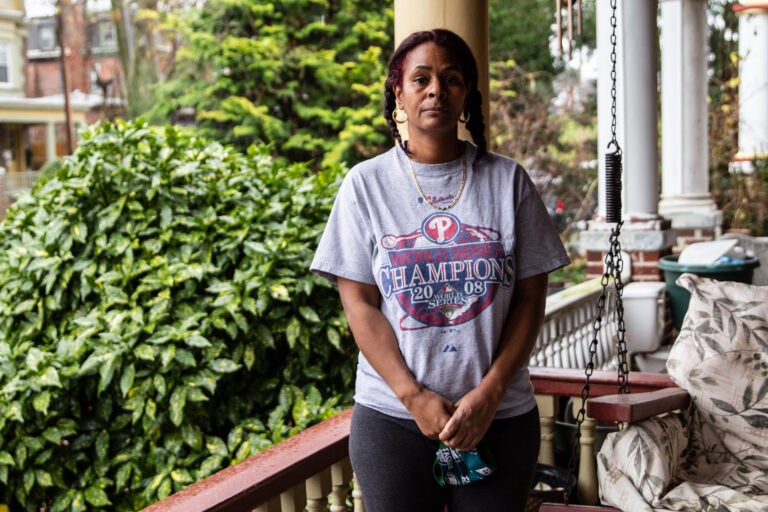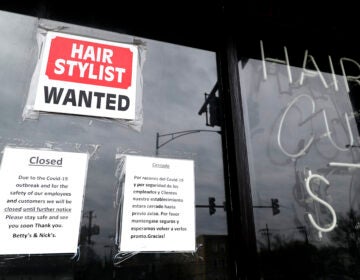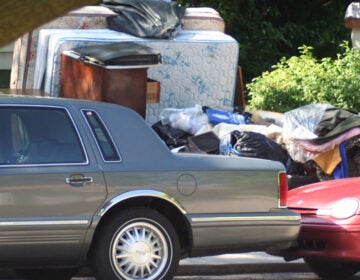‘Pulling the floor out’: As pandemic unemployment expires, people downsize, go into debt
About 400,000 Pennsylvania residents are expected to lose Pandemic Unemployment Assistance when it sunsets the day after Christmas.

Adrienne Berry will lose Pandemic Unemployment Assistance at the end of December. (Kimberly Paynter/WHYY)
Ask us about COVID-19: What questions do you have about the current surge?
About one in 20 Pennsylvanians has already lost or will lose unemployment compensation by the end of the year, as the federal programs meant to ease pandemic job-loss run out and Congress stalls on more pandemic relief spending.
They’re not happy about it.
“I just think it’s a lot of game-playing,” said Adrienne Berry, 53, of the current back-and-forth between Democrats and Republicans over a new stimulus package. Members of the U.S. Senate just introduced a bipartisan relief bill, but disagreements and competing versions of the legislation remain.
Berry, who lives in Delaware and has run a cleaning business for more than two decades in the Philadelphia area, began receiving federal Pandemic Unemployment Assistance, or PUA, in July.
Her work cleaning show rooms and newly constructed buildings has largely disappeared. Her mortgage is in forbearance until February.
“People are really suffering, hurting, homeless, hungry, and it’s sinful,” said Berry, who said she did not believe there would be any federal relief until after President-elect Joe Biden is sworn in. She has been able to lean on her family to get by.
About 400,000 state residents are expected to be actively enrolled in Pandemic Unemployment Assistance when it sunsets on Dec. 26, according to the Pennsylvania Department of Labor and Industry. Another 200,000 will exhaust their allotted 39 weeks of PUA payments before that date.
When the program launched in April, it provided not only weekly payments based on previous income, but also an additional $600 a week. That boosted amount phased out in July, but PUA has continued to pay between $195-$572 a week to eligible recipients.
A different program, called Pandemic Emergency Unemployment Compensation, or PEUC, will end on the same day. The 109,000 people in Pennsylvania enrolled in that program will be eligible to transfer to receive different money, called extended benefits. That will end after an additional 13 weeks.
Taken all together, those programs enroll the majority of people receiving unemployment benefits in the commonwealth right now, said Lauren Bauer, a fellow in economics studies at the Brookings Institution.
She predicted that continued unemployment support in addition to direct subsidies to all people will be needed to lift the United States out of the worst economic conditions since the Great Depression.
“Pulling the floor out from families hurt the hardest here makes it much less likely that we’re going to see consumption levels where we need for the engine of the economy,” Bauer said.
An unsteady lifeline
Fraud, underpayment, and overpayment of claims have all bogged down PUA claimants, even as others say the program is a lifeline.
Berry only received two weeks of payments before new anti-fraud measures halted her payments. Pennsylvania, and many other states, found that their unemployment systems were being targeted by criminals who used stolen identities to apply for benefits. The state instituted a series of changes, such as disbursing payments on debit cards rather than via direct deposit, to cut down on fake users.
Berry submitted new identification information in September and expects to receive retroactive payments this week but said the process has made her “very stressed.”

Clover Hines, 39, worked at a beauty salon as an independent contractor until March. A month after she enrolled in PUA, she said she received “a huge overpayment.”
Hines sent the money back, but said she “almost wishes” she had not because the state has been slow to process the return while at the same time cutting her weekly payments as garnishment for overpayment.
Still, the aid she has received has helped her pay bills, but her 39 weeks of unemployment runs out next week and her work offerings are still far below normal.
“I would like them to extend it because it does help a lot,” she said. She has been occasionally doing hair at her house, to make ends meet.
Some people have had less luck correcting their claims.
Michael Yorke worked as a home remodeling contractor in Delaware and Chester counties before the pandemic. He received PUA until July, when the payments stopped. He said at his age, 67, he is not comfortable working in other peoples’ houses while the pandemic still rages.
“Pennsylvania cut me off and cut my wife off without a word and without an explanation,” he said. “Perhaps being ignored for this long makes me cynical but I think that we should expect better.”
His wife, a realtor, is in the same boat. Yorke said he was able to get through to a call center employee last week, and was told he needed to produce more documentation to prove who he is. Now, he’s afraid he will lose his chance of recouping the money he is owed once the program expires.
“We’ve actually been burning savings … we’re burning up the end of the road,” said Yorke, who is dipping into money they intended to save for retirement.
Pennsylvania will continue to pay out back payments to eligible recipients who had their claims held up for any reason “until we are given a stop date by the federal government,” said Labor and Industry Press Secretary Sarah DeSantis.
The Philadelphia Inquirer reported that 500,000 claimants had their cases flagged for fraud in October, and experienced an interruption in benefits. This week, L&I said they believe the vast majority of those attempts were in fact fraudulent.
For some people with legitimate claims who hoped the payments would help them pivot to a new career, the dismal job market has stymied aspirations.
“After 75 applications I have yet to receive an interview,” said Lou C., a photographer based in South Philadelphia who has been looking for work for five months. He asked that his last name be withheld for fear that it would hurt his search.
Lou said when the additional $600 a week was still being paid, through July, he was not making as much money as he did photographing large events, often for universities, but he was doing well enough to chip away at credit card debt. Now, he’s facing the prospect of yet more debt to get through this period.
He is also slowly giving up on the idea that he will be able to pull off a career pivot before the economy recovers.
“I have been trying to apply for positions that could be a career, looking for 9-5 jobs … I’m probably going to have to apply to grocery stores or Best Buy just to have an income” once PUA expires, he said.
—
Correction: A previous version of this article misstated Sarah DeSantis’ title.

Get more Pennsylvania stories that matter
WHYY is your source for fact-based, in-depth journalism and information. As a nonprofit organization, we rely on financial support from readers like you. Please give today.




![CoronavirusPandemic_1024x512[1]](https://whyy.org/wp-content/uploads/2020/03/CoronavirusPandemic_1024x5121-300x150.jpg)

